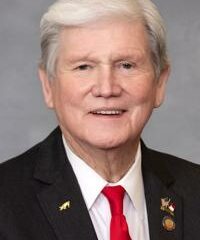(The Center Square) – Arkansas Gov. Sarah Huckabee Sanders said she wants her state to eat healthier.
The Republican submitted a waiver to the U.S. Department of Agriculture (USDA) on Tuesday seeking federal approval for her plan to ban soft drinks and candy from Arkansas’ Supplemental Nutrition Assistance Program (SNAP), often called food stamps.
“America’s facing a chronic disease epidemic,” Sanders said during a news conference Tuesday announcing her plans. “Obesity, diabetes, heart disease and other chronic illnesses are personal struggles for millions of Americans and driving significantly higher costs in our healthcare system. Sadly, Arkansas statistics are even worse than the nation as a whole.”
Critics of the move, such as American Beverage, derided the governor’s decision, arguing that the waiver won’t improve health outcomes and noting that the beverage industry supports 1,385 jobs statewide and contributes $391.9 million annually to the Arkansas economy.
“Make no mistake, this waiver won’t make an ounce of difference on health,” the trade organization said in a news release. “Obesity has skyrocketed in the last two decades while beverage calories per serving have dropped by 42% – thanks to our industry’s efforts to empower Americans with more choice and information. In fact, 60% of beverages Americans buy today have zero sugar due to our innovation.”
American Beverage noted the change would still let people buy various desserts, snack cakes, and other unhealthy items while only excluding two types of products.
“If Governor Sanders is serious about making Arkansas healthy again, this would be a comprehensive effort – not one narrowly focused on excluding one population from buying just two sets of products in the grocery store,” it added.
Sanders noted that one-third of Arkansas residents are either diabetic or pre-diabetic, a number she wants the state to reduce.
“When the numbers are that high, it’s important for us to examine a system that actively encourages and subsidizes unhealthy, highly processed, addictive products,” she said.
While speaking about chronic illness, Arkansas Department of Human Services Secretary Kristi Putnam said it’s logically inconsistent for a state to pay to make people unhealthy and then pay to try to manage their poor health.
“This makes no sense,” Putnam said. “Everything we do at DHS should contribute to improving health.”
“Why do we contribute to poor health in one program and then try to fix it in another program?” she added.
American Beverage countered, saying Sanders is sending a conflicting message.
“If the Governor is sincere about what taxpayers can buy with SNAP dollars, this sends a ridiculously conflicted message: it’s okay to buy a wide array of desserts, snack cakes and treats, just not soda and candy,” it said. “How does that make sense? Now if Arkansas really wanted to save its taxpayers money, it could eliminate the $44.7 million in SNAP fraud and overpayments in the state.
The waiver also requests that the USDA let Arkansas make rotisserie chicken a SNAP-eligible item; heated foods are generally ineligible for SNAP purchases.
USDA Secretary Brooke Rollins, who attended the news conference, said the request from Arkansas fits President Donald Trump’s public health agenda.
“President Trump has given his administration, our administration, a mandate to make America healthy again,” she said. “This is one of the things he campaigned on and this is what the American people voted for.”
American Beverage noted that Trump also campaigned on U.S. jobs and stands with American workers.
“America’s beverage companies will always stand with our consumers and their right to make the best decisions for their families. We are working every day to deliver more choices and information and do our part in making America healthier,” it said. “And we’re providing the good-paying, family-supporting jobs the president wants – the type of jobs that don’t require you to be on SNAP in the first place. Just as with our consumers, our workers and products don’t deserve to be denigrated either.”
SNAP is a $119 billion program that provides food for lower-income Americans. Yet, 23% ($27 billion) of that spending goes towards unhealthy foods like soda, candy, desserts and unhealthy snacks, according to a news release from the governor’s office.
Sanders said during the news conference that she’s not banning people from buying junk food.
“The government isn’t dictating what you can and can’t buy with your hard-earned money,” she said. “It’s simply saying that taxpayers are no longer going to cover the cost of junk food like candy and soft drinks.”










































